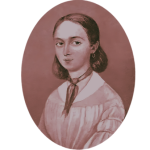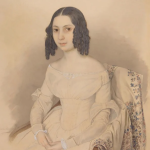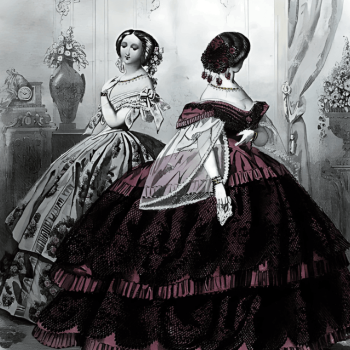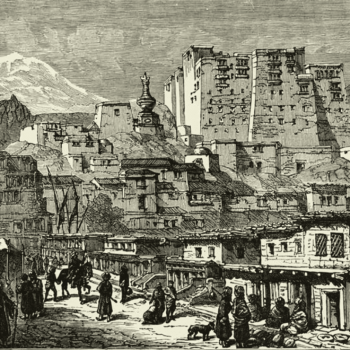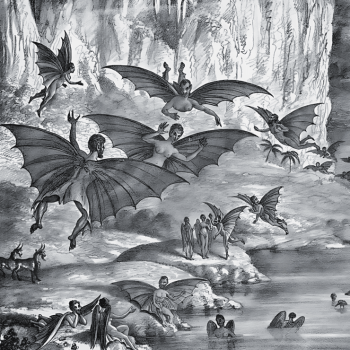STEPPES
Count Kiselev wanted to hand Andrei Mikhailovich all the papers concerning the Saratov Province and send him straight away to Saratov to manage affairs pending the opening of the Chamber of State Property. But Andrei Mikhailovich reminded him that he was currently in service with another ministry, holding the position of Chief Trustee over the Kalmyks, and to go to Saratov he must first receive an official appointment and title. This would be more convenient to do after the opening of the chamber. Governor Timiryazev also asked Count Kiselev to leave him in Astrakhan, but the Count said that he needed him in Saratov, one of the most important provinces. Meanwhile, Andrei Mikhailovich presented Egor Vasilyevich Karneev (Secretary of State) with his ultimatum for communication to the minister, i.e. the conditions under which he agreed to remain in his service (regarding his pay.) These conditions were accepted without the slightest difficulty. Count Kiselev, having read his note about the Kalmyk, became interested in them, and transferred the oversight of the Kalmyks to his department. He asked Andrei Mikhailovich to engage in the review of the audits of other auditors before the time of my departure (which he did not like at all, especially fearing that this would detain him even longer in St. Petersburg.) The Count showed great favor towards Andrei Mikhailovich and told Governor Timiryazev that he would certainly move him forward in service.
In February Rostya passed the final examination, being one of the first in the number of points, and entered the artillery school. That same month, on February 28th, both ministers released Andrei Mikhailovich to return to Astrakhan after nearly half a year of residence in the capital. The road was again extremely bad due to the spring thaw. He barely arrived at the end of March. However, the journey was not boring for him, because he found a companion, a kind, educated, but very willful man named Vladimir Filippovich Pfeller, who had been newly appointed Vice Governor in Astrakhan.[1] He had previously served in the diplomatic service and had long been secretary of the embassy in Copenhagen.
Upon his return, Andrei Mikhailovich continued to attend to the affairs of the Kalmyk administration. On May 12 Elena Pavlovna and the children went to Pyatigorsk for a second course of treatment in mineral waters, where Helena Andreevna came to visit her and also for treatment. Andrei Mikhailovich remained in Astrakhan alone until August. During this time he made only short trips on Kalmyk affairs in nearby places. Governor Timiryazev also returned, having failed to secure a transfer from Astrakhan. On August 9 he went to his family and remained with them in Pyatigorsk, and then in Kislovodsk until the end of the month. He was pleased to meet many old acquaintances, it was especially pleasant to see Count August Ludwig von Nostitz, Prince V. S. Golitsyn, General Zabolotsky, and Martens (an old Mennonite friend.)[2]
This trip to Pyatigorsk was one of the earliest memories for young Vera, who would, many years later, recall how she squinted in the sun on a hot summer day while her carriage lazily swayed on the dusty path with faded greenery. The carriage silently entered a shady alley that approached a large house with a long gallery. Some old soldier, seeing the wagon from a distance, smiled and, holding his visor, shouted: “We wish good health to the bow-legged captain!” Nanny Orina took Vera out of the carriage and carried her for a bath. She took her to the waters every day to bathe in sulfur water. Then they put her in hot sand for another whole hour, piled up in a heap on the small gallery of their apartment. Although she was in her third year, she understood and spoke everything, but she could not walk. However, her legs were only weak, and not crooked, despite the unfortunate nickname “bow-legged captain” given to her by the guard at the bathhouse. (He called her “captain” because her father was Colonel Pyotr Alekseevich.) The waters helped Vera. After Pyatigorsk, she started walking.[3] Helena Andreevna felt that something was off, however. Were these little reproaches from her mother, or was she overreacting? Was Katya being cold toward her? Of course not, Katya has a noble and kind character, she thought, “She is better than me, I know this and silently bear my sadness.” Still, she could not help but feel that there was a hidden displeasure germinating.[4]
After the barren Astrakhan steppe, the eyes were pleasantly rested at the sight of the rich Caucasian nature, luxurious vegetation, bright greenery, and countless varieties of the most beautiful flowers. But Andrei Mikhailovich did not enjoy this spectacle for long and at the beginning of September he returned with all his people to Astrakhan. That autumn he made two trips. The first trip was to the salt lakes in the lower reaches of the Volga with Governor Timiryazev. This was to discern whether there was any truth to the rumor that the mines would yield a profit. A proper investigation would have required at least a week, but they stayed considerably less amount of time. Having left Astrakhan early in the morning, they drove the courier horses at full speed until they arrived. They looked at the lakes, dined on a noble sterlet ear, and pheasants (with an abundance of champagne) and at ten o’clock that same evening they turned back to Astrakhan.
His second journey was to inspect two Kalmyk uluses; and while riding along the meadow side of the Volga, he visited Krasny Yar, remarkable for the peculiarities of its location and productivity. It was impossible to get there from Astrakhan otherwise than by water in a canoe. The place was renowned for its abundance of apples, onions, and mosquitoes. Andrei Mikhailovich had never seen mosquitoes in such numbers in his entire life. (In former times, governors sent officials and clerks there in the summer to be tormented by mosquitoes as a punishment for drunkenness and fraud.) At the end of 1838, he was appointed manager of the Astrakhan Chamber of State Property, while retaining the position of Chief Trustee of the Kalmyk people. This significantly improved my position, raising his salary to twelve thousand rubles in banknotes per year, which at that time constituted the highest salary of the governor. For his work in surveys during the previous two years, he received 1,500 dessiatines of land (which was allocated to him only in 1858, in the Stavropol Province.) Since they began to distribute empty state lands as rewards to officials, both in the land-rich provinces of Russia and in the Caucasus, plots that could bring in any decent income had only been given, for the most part, to those who had strong protection or were capable of intrigue by any means. Those who were not gifted with this ability (of whom Andrei Mikhailovich was one) usually received plots that either did not bring in any income at all or the most insignificant of income. An order of this kind was completely at odds with the good wishes of sovereigns, so that this reward for deserving officials, really, as far as possible, provided for them or their families.[5]
-
- NOVOROSSIYA
- The Arbiter Of Europe’s Destiny.
- The House Dolgorukuy
- Madame Krüdener
- Ekaterinoslav
- The Arabat Arrow
- The Mystery Of General Inzov
- The Doukhobors
- Pushkin
- Chuguev Military Settlement
- “The Blessed”
- The Decembrists
- Penza
- Independence
- Last Words Of Samuel Khristianovich Kontenius
- “Amid Coffins And Desolation”
- Rusalka
- Dead Souls
- Secret Passages
- Astrakhan
- Nevsky Prospekt
- Kalmyk Ulus
- Love And Ambition
- Duellistes
- Pyatigorsk
- A Heroine Of Our Time
- Winter Palace
- Zeneida R-Va
- Steppes
- Letter To Natalya
- Fire And Ice
SOURCES:
[1] “[Vladimir Filippovich Pfeller,] was the Vice Governor of Astrakhan (1838-1841,) Ryazan (1841-1843) and Podolsk (1843-1856,) and then the Civil Governor of Arkhangelsk (1856,) Podolsk (1856-1860) and Vologda (1860-1861,) and died with the rank of Civil Councilor in 1885.” [Polovtsov, A. A. Russian Biographical Dictionary. Vol. XV: Prittwitz-Reis. Imperial Academy of Sciences. St. Petersburg, Russia. (1910): 349-350.]
[2] Fadeev’s original text only mentions the name “Zabolotsky.” This is presumably a certain General Zabolotsky who commanded Cossack troops. [“Current Events.” The Home And Foreign Review. Vol. II, No. 4 (April 1863): 675-716.] The Martens mentioned here is probably Jacob Martens. One account states: “Jacob Martens [was] a minister who when a boy of fourteen, had attended a meeting held by [Grellet.]” [Robson, Isaac. Narrative Of The Visit Of Isaac Robson: And Thomas Harvey To The South Of Russia. R. Barrett and Sons, Printers. London, England. (1868): 28.]
[3] Zhelihovskaya, Vera Petrovna. How I Was Little. A. F. Devrien. St. Petersburg, Russia. (1898): 1-6.
[4] [“Letter From E. A. Hahn To Natalya P. Dated January 10, 1839. [Kamenskoye Village, Ekaterinoslav Province.]” [Preparation of the text and comments by A.D. Tyurikov. Bahmut Roerich Center. Originally published in: Gershenzon, M.O. “Russian Woman Of The ‘30s.” Russian Thought. Vol. XII, C. 55 (December 1911.)]
[5] Fadeyev, Andrei Mikhailovich. Vospominaniia: 1790-1867. Vysochaishe Utverzhd. Yuzhno-Russkago. Odessa, Ukraine. [Russian Empire.] (1897): Part I: 142-145.


